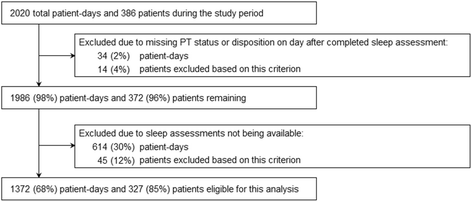The association of sleep quality, delirium, and sedation status with daily participation in physical therapy in the ICU
- PMID: 27538536
- PMCID: PMC4990875
- DOI: 10.1186/s13054-016-1433-z
The association of sleep quality, delirium, and sedation status with daily participation in physical therapy in the ICU
Abstract
Background: Poor sleep is common in the ICU setting and may represent a modifiable risk factor for patient participation in ICU-based physical therapy (PT) interventions. This study evaluates the association of perceived sleep quality, delirium, sedation, and other clinically important patient and ICU factors with participation in physical therapy (PT) interventions.
Method: This was a secondary analysis of a prospective observational study of sleep in a single academic medical ICU (MICU). Perceived sleep quality was assessed using the Richards-Campbell Sleep Questionnaire (RCSQ) and delirium was assessed using the Confusion Assessment Method for the ICU (CAM-ICU). Other covariates included demographics, pre-hospitalization ambulation status, ICU admission diagnosis, daily mechanical ventilation status, and daily administration of benzodiazepines and opioids via bolus and continuous infusion. Associations with participation in PT interventions were assessed among patients eligible for PT using a multinomial Markov model with robust variance estimates.
Results: Overall, 327 consecutive MICU patients completed ≥1 assessment of perceived sleep quality. After adjusting for all covariates, daily assessment of perceived sleep quality was not associated with transitioning to participate in PT the following day (relative risk ratio [RRR] 1.02, 95 % CI 0.96-1.07, p = 0.55). However, the following factors had significant negative associations with participating in subsequent PT interventions: delirium (RRR 0.58, 95 % CI 0.41-0.76, p <0.001), opioid boluses (RRR 0.68, 95 % CI 0.47-0.99, p = 0.04), and continuous sedation infusions (RRR 0.58, 95 % CI 0.40-0.85, p = 0.01). Additionally, in patients with delirium, benzodiazepine boluses further reduced participation in subsequent PT interventions (RRR 0.25, 95 % CI 0.13-0.50, p <0.001).
Conclusions: Perceived sleep quality was not associated with participation in PT interventions the following day. However, continuous sedation infusions, opioid boluses, and delirium, particularly when occurring with administration of benzodiazepine boluses, were negatively associated with subsequent PT interventions and represent important modifiable factors for increasing participation in ICU-based PT interventions.
Keywords: Delirium; Early ambulation; Intensive care unit; Rehabilitation; Sedation; Sleep.
Figures
Similar articles
-
Delirium transitions in the medical ICU: exploring the role of sleep quality and other factors.Crit Care Med. 2015 Jan;43(1):135-141. doi: 10.1097/CCM.0000000000000610. Crit Care Med. 2015. PMID: 25230376 Free PMC article.
-
Rapidly reversible, sedation-related delirium versus persistent delirium in the intensive care unit.Am J Respir Crit Care Med. 2014 Mar 15;189(6):658-65. doi: 10.1164/rccm.201310-1815OC. Am J Respir Crit Care Med. 2014. PMID: 24423152
-
Reducing deep sedation and delirium in acute lung injury patients: a quality improvement project.Crit Care Med. 2013 Jun;41(6):1435-42. doi: 10.1097/CCM.0b013e31827ca949. Crit Care Med. 2013. PMID: 23507716
-
Associations between sedation, delirium and post-traumatic stress disorder and their impact on quality of life and memories following discharge from an intensive care unit.Dan Med J. 2013 Apr;60(4):B4630. Dan Med J. 2013. PMID: 23651729 Review.
-
Dexmedetomidine and paralytic exposure after damage control laparotomy: risk factors for delirium? Results from the EAST SLEEP-TIME multicenter trial.Eur J Trauma Emerg Surg. 2022 Jun;48(3):2097-2105. doi: 10.1007/s00068-021-01813-x. Epub 2021 Nov 22. Eur J Trauma Emerg Surg. 2022. PMID: 34807273 Review.
Cited by
-
Sleepless in the hospital: A systematic review of non-pharmacological sleep interventions.Gen Hosp Psychiatry. 2019 Jul-Aug;59:58-66. doi: 10.1016/j.genhosppsych.2019.05.006. Epub 2019 May 24. Gen Hosp Psychiatry. 2019. PMID: 31170567 Free PMC article.
-
Octogenarian patients' sleep and delirium experiences in hospital and four years after aortic valve replacement: a qualitative interview study.BMJ Open. 2021 Jan 7;11(1):e039959. doi: 10.1136/bmjopen-2020-039959. BMJ Open. 2021. PMID: 33414142 Free PMC article.
-
Sleep and Delirium in Older Adults.Curr Sleep Med Rep. 2020;6(3):136-148. doi: 10.1007/s40675-020-00174-y. Epub 2020 Jul 27. Curr Sleep Med Rep. 2020. PMID: 32837850 Free PMC article. Review.
-
Delirium in a Latin American intensive care unit. A prospective cohort study of mechanically ventilated patients.Rev Bras Ter Intensiva. 2017 Jul-Sep;29(3):337-345. doi: 10.5935/0103-507X.20170058. Rev Bras Ter Intensiva. 2017. PMID: 29044304 Free PMC article.
-
Physical Rehabilitation in Critically Ill Children: A Multicenter Point Prevalence Study in the United States.Crit Care Med. 2020 May;48(5):634-644. doi: 10.1097/CCM.0000000000004291. Crit Care Med. 2020. PMID: 32168030 Free PMC article.
References
-
- Berney SC, Harrold M, Webb SA, et al. Intensive care unit mobility practices in Australia and New Zealand: a point prevalence study. Crit Care Resusc. 2013;15(4):260–265. - PubMed
Publication types
MeSH terms
Grants and funding
LinkOut - more resources
Full Text Sources
Other Literature Sources
Medical


